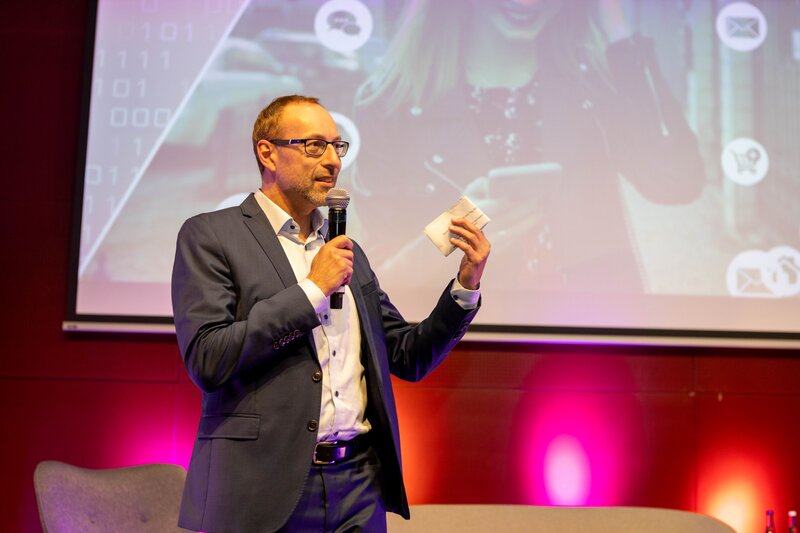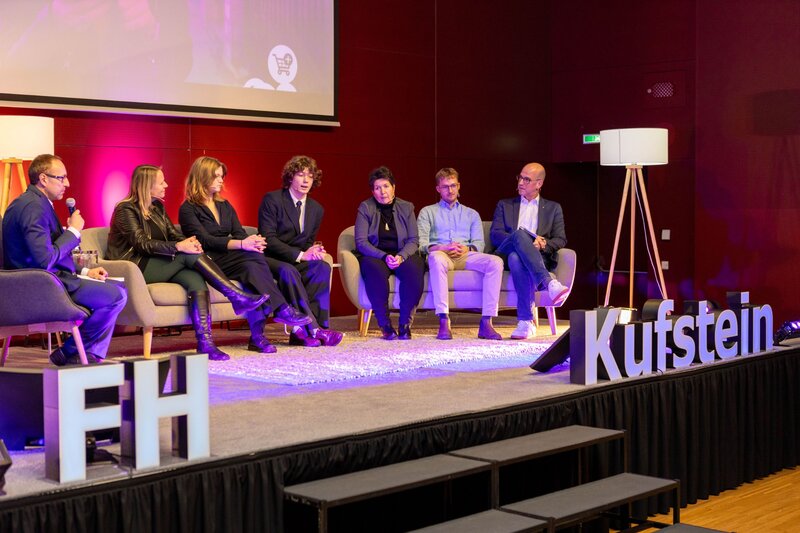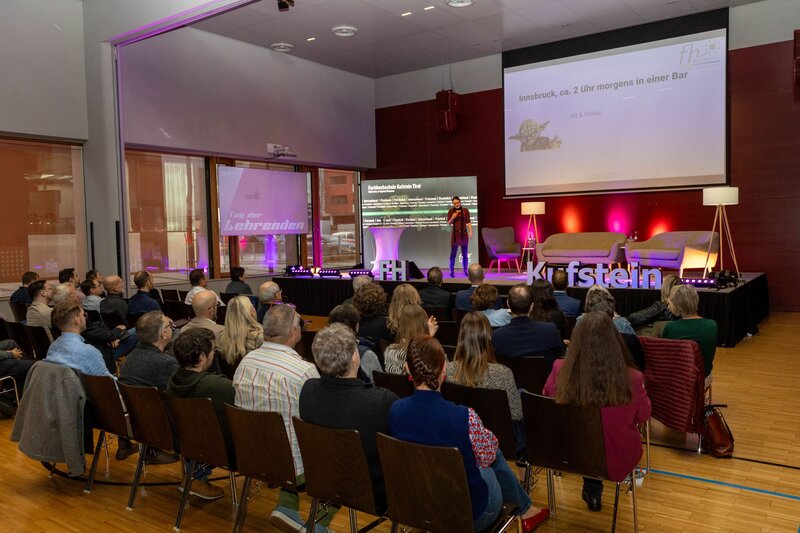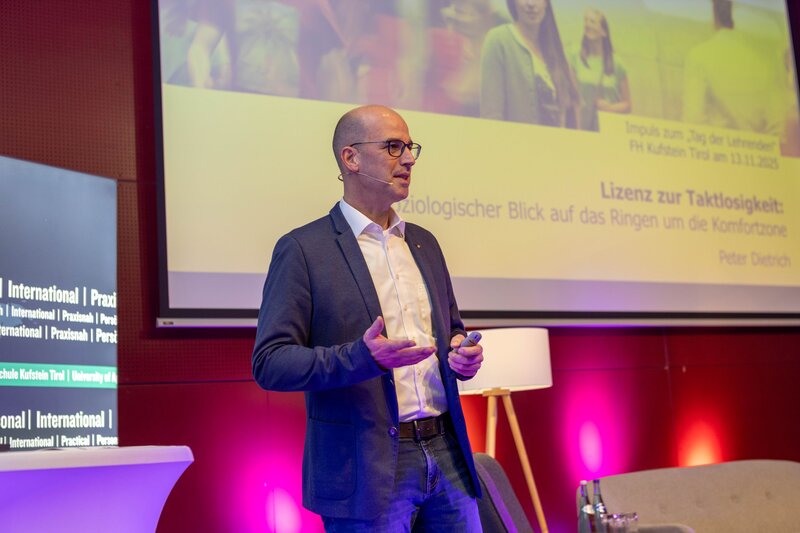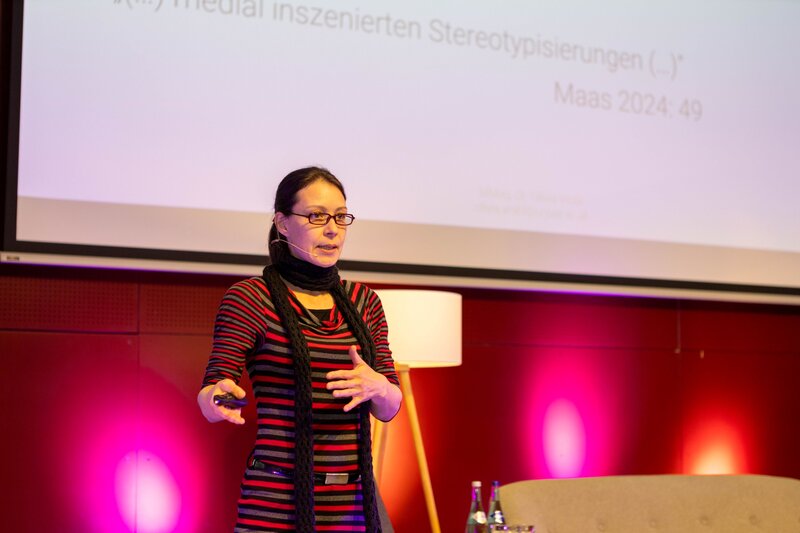Lecturers' Day: Teaching towards Generation Z
- 28.11.2025
- Event Review
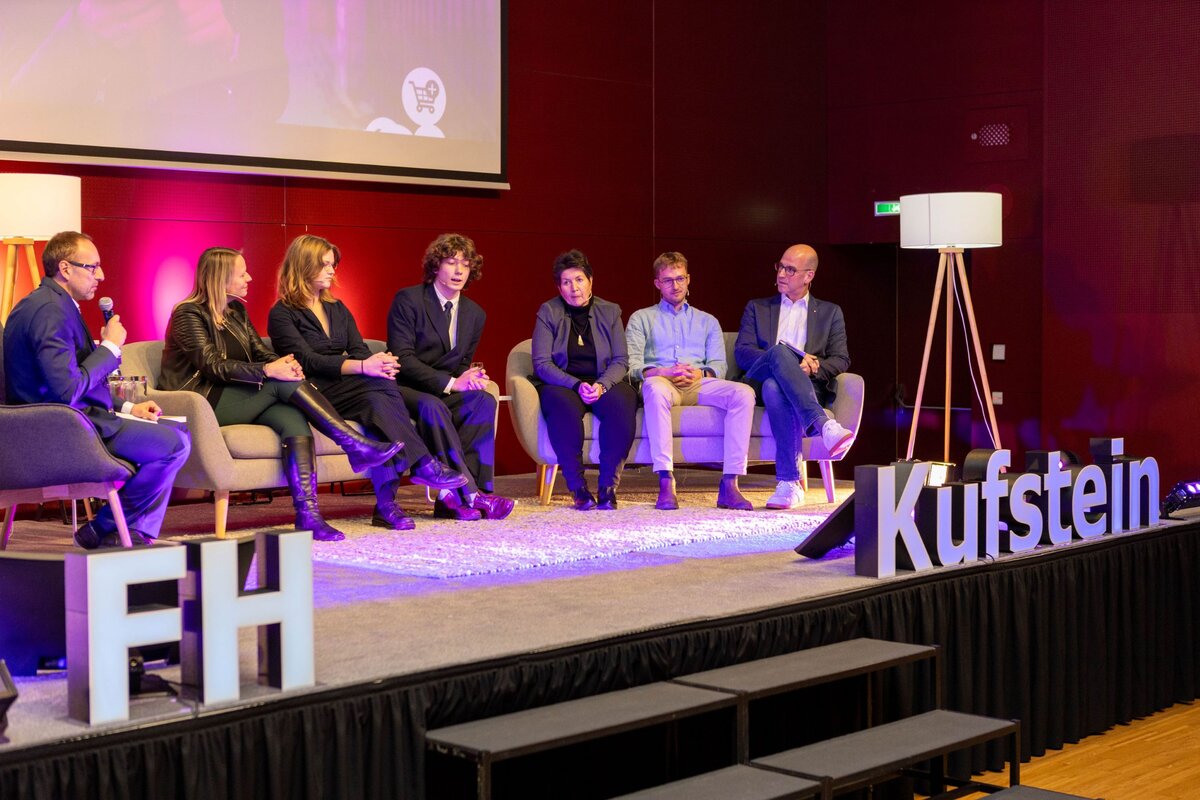
The panel discussion at the Lecturers' Day 2025 brought together experts, lecturers, and students to shed light on different perspectives on the future of teaching and how to deal with Generation Z.
In mid-November 2025, the Lecturers' Day took place at the University of Applied Sciences Kufstein Tirol. The focus was on Generation Z and its influence on teaching. The keynote speech by didactics expert Olivia Vrabl, practical insights, and a panel discussion provided a wide range of insights into the future of teaching.
On Thursday, 13. November 2025, the University of Applied Sciences Kufstein Tirol once again hosted its Lecturers' Day - an afternoon dedicated to exchange, inspiration and didactic development.
University Rector Prof. (FH) PD Dr. Mario Döller opened the event with a look at the ongoing transformation of university teaching. He emphasized that teaching and learning have always been in a state of flux - from traditional lecture formats to modern blended learning formats. The rapid push toward digitalization in recent years in particular has shown how important flexible, student-centered teaching concepts have become.
KEYNOTE: HOW GENERATION Z IS CHANGING THE WAY OF EDUCATION
The highlight of the day was the keynote speech by MMag. Dr. Olivia Vrabl, who works as an educationalist in several European countries and has been involved in teaching and educational research for over 30 years. She not only develops her own educational concepts, but also supports institutions ranging from traditional educational establishments to the construction industry, focusing on course planning, methodology, assessment, and the feed forward approach.
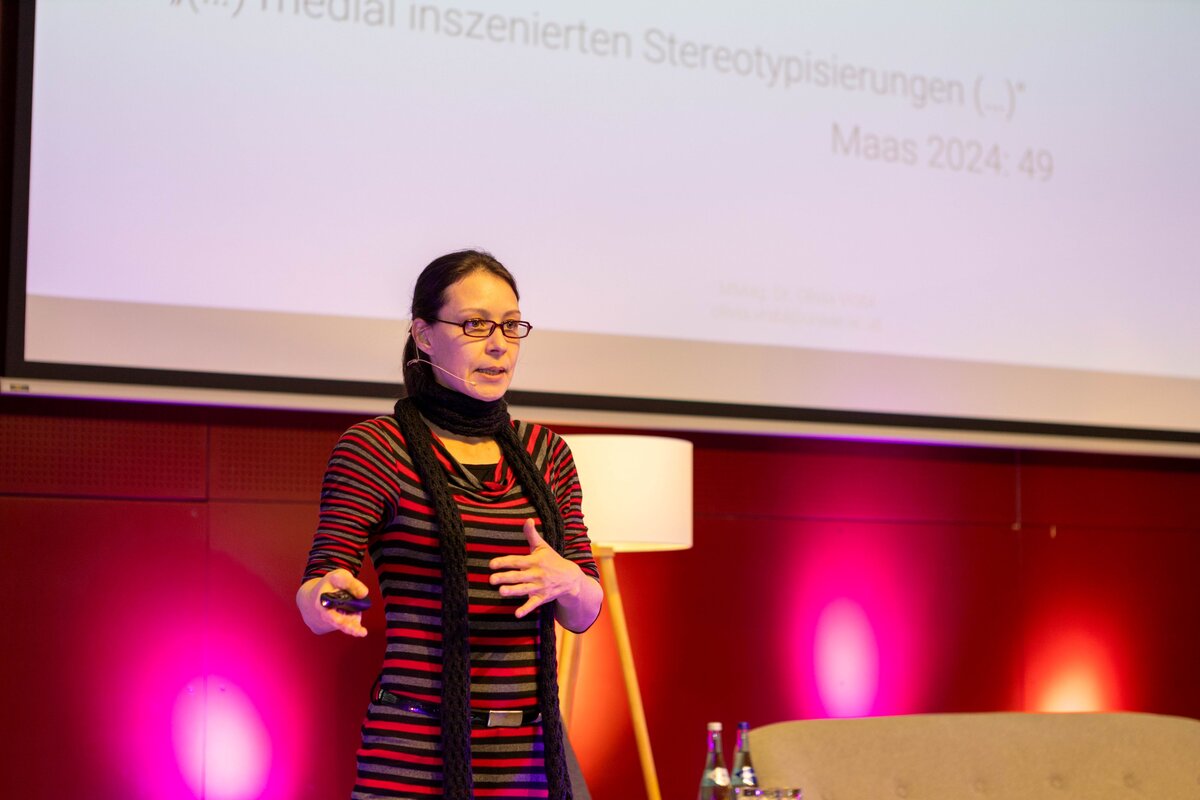
Olivia Vrabl, well-known didactician and keynote speaker, provided exciting insights into the thinking and learning styles of Generation Z.
In her presentation, she impressively demonstrated how Generation Z thinks and learns. According to Vrabl, this generation is strongly purpose-driven, open to dialogue, and has high expectations in terms of relevance and authenticity. Students are questioning the purpose of learning more than ever before and want self-determined learning paths, flexible learning locations, digital support, and immediate feedback.
Above all, she emphasized methods such as just-in-time teaching, which enable teaching content to be adapted to the learning level of the situation. Equally important, she said, is a clear culture of appreciation and the ability to tailor learning opportunities to individual needs. Vrabl thus presented a nuanced and practical picture of how teaching can be designed in the future to best reach Gen Z students.
CONTRAST: PETER DIETRICH'S LICENSE TO BE TACTLESS
Prof. (FH) Dr. Peter Dietrich, program director of the bachelor's and master's programs in International Business Management, deliberately set a contrasting tone. Under the title License to be tactless, he argued that we should not only accommodate Generation Z, but also take a clear stance toward them where necessary.
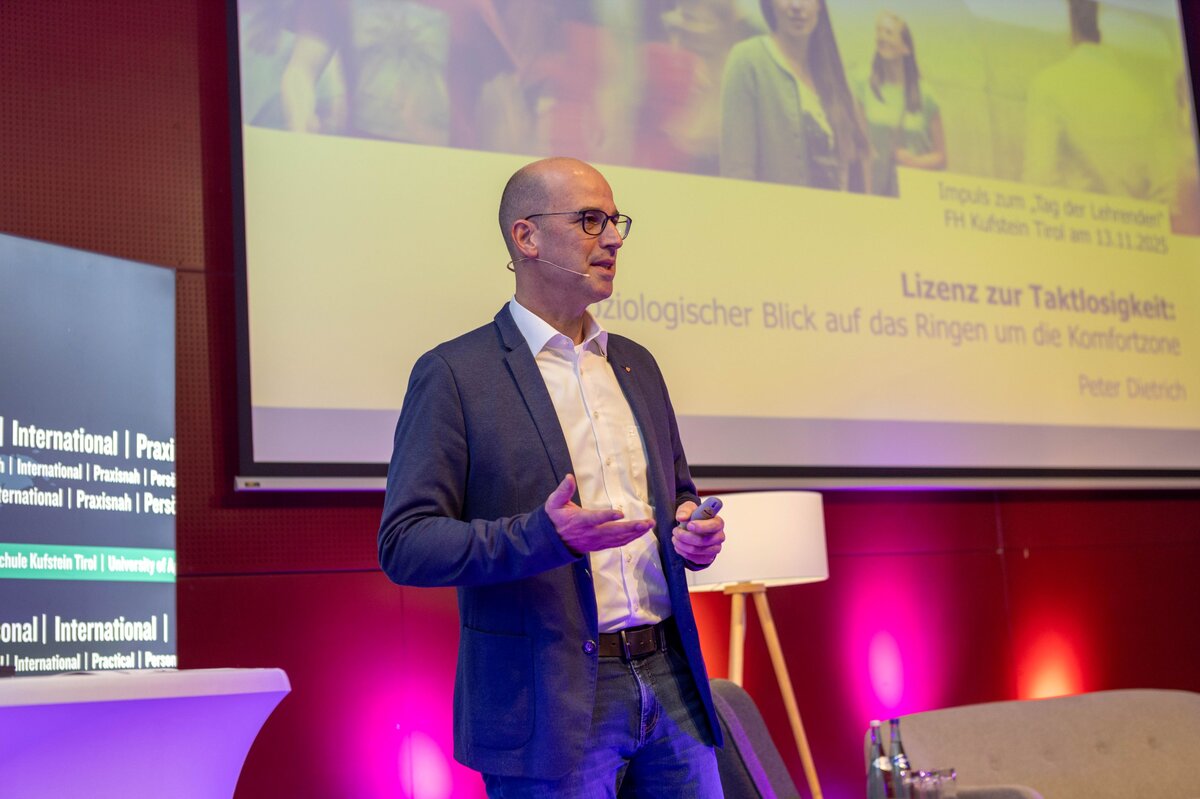
Peter Dietrich consciously took a contrasting tone in his keynote speech, calling for a clear stance toward Generation Z.
Dietrich took his audience on a sociologically influenced journey through interaction and communication in university teaching. He described how teachers are increasingly confronted with forms of strategic self-presentation – from pseudo-engagement and moral reframing to a certain offensive role distance.
He emphasized that it was not a matter of criticizing students, but rather of highlighting the comfort zone dynamics in which learning processes take place. His suggestion: teachers should - and must - use a measured amount of tactlessness in certain situations in order to initiate learning processes and break patterns.
Dietrich put it this way: Teachers are both players in the struggle for the comfort zone and referees who occasionally have to intervene deliberately to enable development. However, this tactful tactlessness should always be appreciative, individually tailored, and embedded in a stable relationship structure. This idea resonated with the audience and stimulated the discourse on Gen Z in a stimulating way.
PANEL DISCUSSION
The subsequent panel discussion brought together perspectives from schools, universities, practitioners, and students. In addition to the insights provided by Olivia Vrabl and Peter Dietrich, the participants discussed key findings from the presentations and how teaching can be made more contemporary - from the role of the comfort zone to new didactic approaches.
Represented on the podium were Rector Prof. (FH) PD Dr. Mario Döller, Prof. (FH) Dr. Peter Dietrich (Head of International Business Management, FH Kufstein Tirol), Director Mag. Karin Eschelmüller (BG/BRG Kufstein), Mag. Daniela Soykan-Tober (Managing Director of Wertgespräche Kommunikation e.U., ORF presenter) and Alexander Wohlfart (industrial engineering student). The panel was complemented by students from the International School Kufstein (ISK): Lilith Pointner and Simeon Bedrov, who provided insights from the perspective of the younger generation and enriched the discussion with valuable everyday perspectives.
EXCHANGE AND NETWORKING
As every year, the Day of Lecturers provided an opportunity for discussion, reflection, and networking - a key element that brings together lecturers, external speakers and experts from the region and provides new inspiration for their own teaching.
Links:
- Overview Event Series | Website

